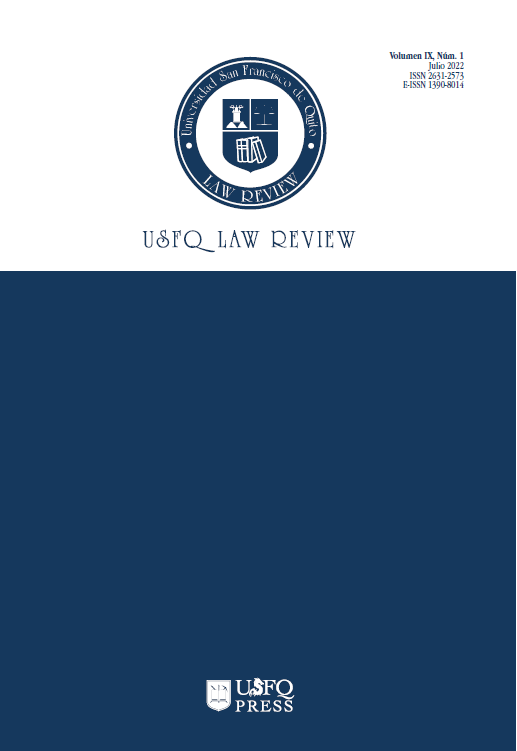Natural Equity in the code of Bello
DOI:
https://doi.org/10.18272/ulr.v9i1.2521Keywords:
Andrés Bello, Civil law, natural equity, legal interpretation, Civil codeAbstract
The objective of this paper is to analyze the concept of natural equity used by Andrés Bello for the interpretation of the civil code. Of course, anyone interested in this subject faces not only methodological difficulties -inherent in any research that seeks to reconstruct the thought or intention of a legislator- but also bibliographical: there is no document in which Bello develops in depth the concept of natural equity, but mere references and allusions -some quite pejorative-. Despite this, and perhaps due to the unique intelligence of caracas, it included important doctrinal references to each article of the code, which will serve as a roadmap to carry out this research. This will allow us to observe that the concept of natural equity used by Bello has important natural legal and moral connotations, but not as a simple reference to the good and the just -which could give way to judicial arbitration-, but to the legal tradition. Natural equity, for Bello, is nothing more than legal experience, accumulated in books, judgments and other documents; it is the prudence proper to the jurist, which he acquires through the study and reflection of law, but which acquires a sense of reality in the daily exercise of the profession.
Downloads
References
Accatino, Daniela. "La fundamentación de las sentencias: ¿un rasgo distintivo de la judicatura moderna?". Revista de Derecho, vol. 15 (2003): 9-35. http://revistas.uach.cl/pdf/revider/v15/art01.pdf
Aguilera, Juan C. "Análisis filosófico de ley en el pensamiento de Andrés Bello". Anuario de Filosofía Jurídica y Social, no. 13 (1995): 269-275.
Amunátegui, Miguel L. Don Andrés Bello y el Código Civil. Santiago: Imprenta Cervantes, 1885.
Ávila, Alamiro. "Londres en la formación jurídica de Bello". Revista de Estudios Históricos-jurídicos, no. 7 (1982): 317-350.
Bello, Andrés. Opúsculos literarios y críticos. Santiago: B.I.M. Editores, 1850.
Bello, Andrés. Obras Completas. (Vol. 9°). Santiago: Impreso por Pedro G. Ramirez, 1885.
Bello, Andrés. Obras Completas. (Vol. 11°). Santiago: Impreso por Pedro G. Ramirez, 1887.
Bello, Andrés. Obras Completas. (Vol. 15°). Santiago: Impreso por Pedro G. Ramirez, 1893.
Bello, Andrés. Derecho Internacional. Santiago: Editorial Nascimiento, 1932.
Bello, Andrés. El Repertorio Americano. Londres, 1826-1827. (Vol. 1°). Caracas: Edición de la Presidencia de la República en conmemoración del Sesquicentenario de la Independencia Literaria de Hispanoamérica, 1973
Delvincourt, Claude. Cours de Code Napoleon. (Vol. 1°). París: Chez P. Gueffier, 1813.
Delvincourt, Claude. Cours de Code Civil. (Vol. 1°). París: L"™Imprimerie de Lebégue, 1819.
Departamento de Ciencias del Derecho, ed. Andrés Bello y el Derecho. Santiago: Editorial jurídica de Chile, 1982.
Domat, Jean. Las leyes civiles en su orden natural. Traducido por F. Vilarrurias y J. Sardá. España: Imprenta de Jose Taulo, 1844.
Guzmán, Alejandro. "Las fuentes de las normas sobre interpretación de las leyes del "Digeste des Lois Civiles" ("Code Civil") de la Luisiana (1808-1825)". Revista de Estudios Histórico-Jurídicos, no. 31 (2009): 171-195. https://dx.doi.org/10.4067/S0716-54552009000100007
Ossandón, Carlos y Ruiz, Carlos, coord. Andrés Bello. Filosofía pública y política de la letra. Chile: Fondo de Cultura Económica, 2013.
Portalis, Jean. (2014). Discurso preliminar sobre el proyecto de Código civil. Traducido por A. Mora. Madrid: Universidad Carlos III de Madrid, 2014.
Tomasello, Leslie. El Código Civil chileno en el prisma del tiempo. Valparaíso: Edeval, 1981
Vattel, Emer. El derecho de Gentes, ó principios de la Ley Natural, aplicados a la conducta, y a los negocios de las naciones y de los soberanos. Traducido por M. Pascual. España: Imprenta de D. Leon Amarita, 1834.
Downloads
Published
How to Cite
Issue
Section
License
In relation to copy rights, authors publishing with USFQ Law Review know and accept its internal policies, including but not limited to:
1. Open Access Policy.
2. Authorship Policy.
3. Copyright Policy.
4. Pre-Publication Policy.
5. Post-Publication Policy.
6. Intellectual Property Protection Policy.
7. Digital Preservation Policy.


